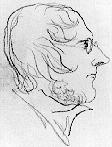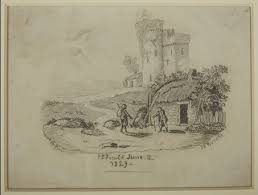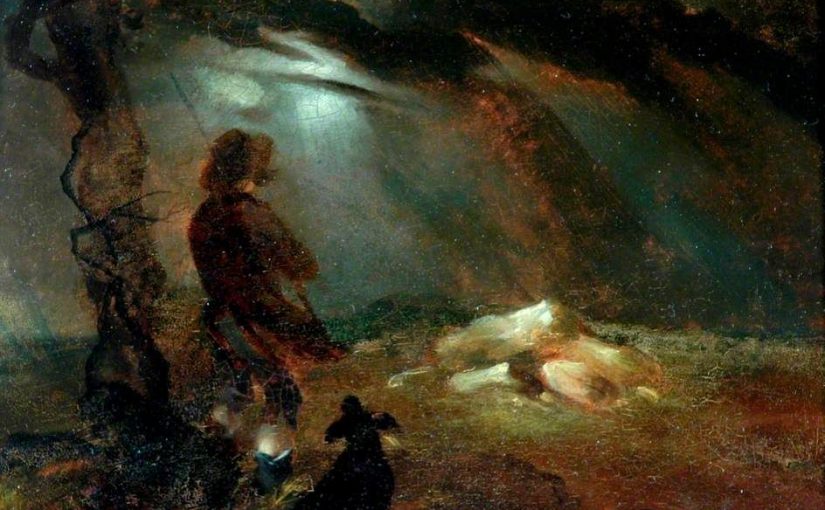June 1848 saw the publication of Anne Brontë’s brilliant, if at the time controversial, second novel, ‘The Tenant Of Wildfell Hall‘, but she wasn’t the first Brontë sibling to be published in this month. That honour goes to her often maligned and misunderstood brother, Branwell.
Patrick Branwell Brontë was a complex man who undoubtedly had some issues that contributed to his decline and death later in the year 1848, but he also undoubtedly was a man of talent. Branwell’s addictions were in all probability linked to issues relating to the childhood losses he suffered – the devastating early deaths of his mother and then his eldest sisters Maria and Elizabeth; we should not, however, let the form of his end cloud our impression of his life as a whole.

Branwell could be a happy, generous brother – it was he after all who shared the gift of twelve toy soldiers with Charlotte, Emily and Anne in July 1826, a gift that was to prove pivotal in unlocking the childhood creativity within the Brontës. Patrick had brought other gifts for his daughters, including a paper doll for Anne, but the soldiers he bought for his son were shared immediately among his siblings as a young Branwell himself remembered:
‘I carried them [the soldiers] to Emily, Charlotte and Anne. They each took up a soldier, gave them names, which I consented to, and I gave Charlotte Twemy, to Emily Pare, to Anne Trot to take care of them, although they were to be mine and I to have the disposal of them as I would.’
These twelve soldiers became the young men who populated their childhood world of the Great Glasstown Confederacy, which in turn became Angria. This is the land behind the incredibly tiny and intricate little books that can still be seen at Harvard University and in the Brontë Parsonage Museum today. It is Branwell that took the lead role in this early creative outburst, as evidenced by the initial name of their books being ‘Branwell’s Blackwood Magazine.’
Branwell was possibly the most enthusiastic early poet of the four remaining siblings, and he was not lacking in ambition, as the conclusion to his letter to Blackwood’s Magazine of Edinburgh in December 1837 showed:
‘Now, sir, do not act like a commonplace person, but like a man willing to examine for himself. Do not turn from the naked truth of my letters, but prove me – and if I do not stand the proof, I will not further press myself upon you. If I do stand it, why, you have lost an able writer in James Hogg, and God grant you may gain one in Patrick Branwell Brontë’
Branwell was also not lacking in talent as a poet, and we do well to remember that Branwell was the first of the Brontë siblings to find themselves in print (Anne was the only other sibling who had her poetry published without paying for it). His verse appeared in a number of local publications under the pseudonym of ‘Northangerland’, a complex character from the Angrian saga, one readily identified with by his creator. Under this guise his work appeared in publications ranging from the Yorkshire Gazette and Leeds Intelligencer to the Halifax Guardian which on June 5th 1841 published his poem ‘Heaven and Earth’.

Branwell had twelve poems published by the Halifax Guardian alone, and this was no mean feat as they took their poetry very seriously, and the standard was very high. Reading Branwell’s poetry today reinforces the impression of a good poet with a real love of verse. It is sad, therefore, that by 1846 his addictions made him unable to be considered for inclusion within ‘Poems by Currer, Ellis and Acton Bell‘.
Branwell was a talented man in many areas; a skilled musician from an early age, a fine artist (his painting ‘The Lonely Shepherd’ adorns this post), and a loving brother who drew sketches for his baby sister Anne – a kindness she never forgot. He could write with both hands at once, composing a Greek letter with his left hand and a Latin letter with his right – an incredible testimony to the talents that lay within him. If Branwell had reached creative maturity I have little doubt that the results would have been brilliant, but certainly for much of his life he was a loving and positive influence on his sisters and on their work.

I will leave you with an extract from Branwell Brontë’s long, moving and brilliant poem ‘Caroline’, in which many see a tribute to the eldest sister he loved, Maria, whose loss cast a life long shadow over his years to come:
‘I stooped to pluck a rose that grew
Beside this window, waving then;
But back my little hand withdrew,
From some reproof of inward pain;
For she who loved it was not there
To check me with her dove-like eye,
And something bid my heart forbear
Her favourite rosebud to destroy.
Was it that bell — that funeral bell,
Sullenly sounding on the wind?
Was it that melancholy knell
Which first to sorrow woke my mind?
I looked upon my mourning dress,
Till my heart beat with childish fear,
And frightened at my loneliness,
I watched, some well-known sound to hear.
But all without lay silent in
The sunny hush of afternoon,
And only muffled steps within
Passed slowly and sedately on.
There lay she then, as now she lies —
For not a limb has moved since then —
In dreamless slumber closed, those eyes
That never more might wake again.
She lay, as I had seen her lie
On many a happy night before,
When I was humbly kneeling by —
Whom she was teaching to adore:
Oh, just as when by her I prayed,
And she to heaven sent up my prayer,
She lay with flower about her head —
Though formal grave-clothes hid her hair!
Still did her lips the smile retain
Which parted them when hope was high,
Still seemed her brow as smoothed from pain
As when all thought she could not die.
And, though her bed looked cramped and strange,
Her too bright cheek all faded now,
My young eyes scarcely saw a change
From hours when moonlight paled her brow.
And yet I felt — and scarce could speak —
A chilly face, a faltering breath,
When my hand touched the marble cheek
Which lay so passively beneath.
And thus it brought me back the hours
When we, at rest together,
Used to lie listening to the showers
Of wild December weather;
Which, when, as oft, they woke in her
The chords of inward thought,
Would fill with pictures that wild air,
From far-off memories brought ;
So, while I lay, I heard again
Her silver-sounding tongue,
Rehearsing some remembered strain
Of old times long agone!’

‘Caroline’ is a most moving poem and I feel much appreciation in the sharing of Branwell’s poetry, and all the Brontë history. Thank you
Thank you for doing justice to this gifted and unfortunate man. It’s been years since I read DuMaurier’s book but I was impressed by Branwell from it and since then I have read his poetry in a paperback edition. Maybe it was a selection.
Branwells poem Caroline is so sensitively written, yet so light to the touch, it cuts through all heavy victorian words or ways.
I love the way he first sees the rose and wants to pick it and then checks himself, feels the pain, the inward pain of memory of love, by picking the rose he would harm, break – and ‘her’ reproof in his memory, was not there to tell him so..
Could someone please send me titles of published works which are by or contain poems by Patrick Branwell Bronte.
Many thanks,
Patrick Thiedeman.